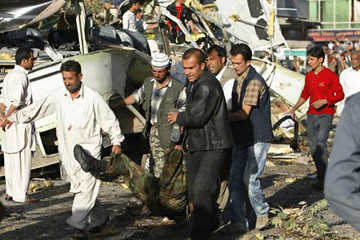
Tomorrow I am scheduled to teach a class on the political advice of Niccolo Machiavelli, some five centuries removed. If this noted Florentine were alive today, he would probably display an unseemly Italian gesture at the political disarray of his beloved Italy and the ineptness of the world’s remaining superpower’s involvement to his geographic Orient. Can you imagine this advice in an updated edition of The Prince: when in doubt or unwilling to act, form a study group. Just over a year ago we had the highly touted and now conveniently shelved Iraq Study Group. The media touted the prominent bipartisan members, the report was available free to the public, and the sitting President more or less brushed aside any recommendation that did not flatter him. This would no doubt please Machiavelli’s realism. He just surged ahead, sending more troops rather than admitting a flawed policy in the first place.
Each day the news media report suicide bombings, now more commonly in Pakistan and Afghanistan. For some this might mean the surge is working. But what about the surge in violence outside Iraq, especially in Afghanistan, the place it all started. Somebody forgot to form a study group for Afghanistan, but now we have it. The Center for the Study of the Presidency has just issued its report of the Afghanistan Study Group, chaired by a former Marine Corps general and a former ambassador. And who could naysay the lofty goal:
“The Afghanistan Study Group will convene a series of working sessions in each topic in order to identify recommendations and milestones that would substantively aid in the economic and political development of the region.”
After all, as Secretary of State Condoleezza Rice is quoted as saying by the Study Group, “An Afghanistan that does not complete its democratic evolution and become a stable, terrorist-fighting state is going to come back to haunt us.” So the Afghanistan Study Group combed the old haunts of the think tanks and collected a number of study-group-savy men, read the tea leaves and have concluded that Afghanistan is on the brink of becoming a “failed state.”
So what is the overarching recommendation in the report, apart from the points obvious to just about anyone before the study began? More study.
“For that purpose, the Study Group proposes to establish an Eminent Persons Group to develop a long-term, coherent international strategy for Afghanistan and a strategic communications plan to garner strong public support for that strategy.”
The bottom line appears to be as follows: President Bush and his administration have failed by coupling Afghanistan with Iraq, so far NATO has failed by not having enough troops and egregious Taliban-backed suicide bombings continue to cripple the feeble and corrupted development efforts. So bring in the “Eminent Persons” for more study. But who could be more eminent than Afghans themselves and who could have more at stake than the current leaders in Afghanistan? Have they asked for another report, in English no less? Do we really need more commissions and more reports and more of the same talk? One year from now, will the Afghanistan Study Group report have any more resonance than that issued with patriotic fanfare by the Iraq Study Group only a year ago?
What more needs to be studied? The political history of Afghanistan, since the Neolithic, has been well documented by scholars. Certainly the long U. S. covert support for Islamic freedom fighters against the godless Communists generated lots of government reports. Afghans themselves have written about the events destroying their country and what to do. Take a country that has never in history been unified, except in name under the most coercive force, destroy its fledgling infrastructure through years of internal and external strife, allow its people to remain largely illiterate and uneducated apart from madrasa abcs, feed the corrupt bureaucracy with a massive influx of foreign aid and demand that Afghans embrace a democracy imposed from the outside. What part of this scenario has not been studied? The omain thing that needs to be studied is why there is such a need for more studies.
But the Eminent Persons Group is not about studying, certainly not in an academic fact-finding sense, as much as it is about political posturing. If our government officials currently making the decisions are not “eminent,” then the buck should stop there. Gathering a posse of former ambassadors and political functionaries who only seem to become eminent when they retire from government service allows the buck not to stop anywhere. Study groups do not solve problems, they mainly provide temporary cover. Blue ribbon commissions on issues of war seldom do anything to stop red-blooded individuals from being killed.
Read the Afghanistan Study Group report, but also look at the day’s news. “A suicide bomber has killed the deputy governor of Afghanistan’s southern Helmand province, along with five other people. Another 18 people were wounded in the attack, when the bomber exploded among worshipers at a mosque in the town of Lashkar Gah on Thursday,” notes Al-Jazeera.
All the study group reports along the Beltway will not bring any of these victims back to life. Nor will this report stop the death toll from surging forward tomorrow.
Daniel Martin Varisco
This post has been picked up by the History News Network.